| Srl | Item |
| 1 |
ID:
140965
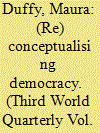

|
|
|
|
|
| Summary/Abstract |
The 21st century has witnessed increasing dissatisfaction with existing democratic institutions and processes and the growth of alternatives to representative democracy. At the same time arguments are emerging that conventional standards for evaluating democracy are ‘out of touch’ with current realities; in particular, with popular understandings, experiences and aspirations of what democracy should look like. This paper draws on empirical research in Caracas, Venezuela into how Venezuelan people understand democracy, in order to build a case that current evaluatory benchmarks are inadequate for understanding complex processes of social change based on more direct and participatory forms of democratic engagement.
|
|
|
|
|
|
|
|
|
|
|
|
|
|
|
|
| 2 |
ID:
140964
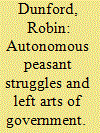

|
|
|
|
|
| Summary/Abstract |
I argue that self-organisation cannot account for how grassroots struggles can pursue transnational political change. I develop an account of some ‘left arts of government’ through which resistance is facilitated and organised without reintroducing oppressive and hierarchical forms of rule. I do so by focusing on the practices of autonomous peasant mobilisations. Land occupation movements facilitate the ability of people to engage in ongoing resistance on their own behalf. They organise resistance through horizontal communication and through transnational networks involving representative structures. Finally, peasant mobilisations engage with states and international institutions to solidify gains made.
|
|
|
|
|
|
|
|
|
|
|
|
|
|
|
|
| 3 |
ID:
140961
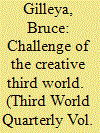

|
|
|
|
|
| Summary/Abstract |
This article is a contribution to recent literature on the shape of the polycentric world order. It argues that the Third World remains a valid concept for describing the interests and ideas that shape the foreign policies of many key non-Western states. However, the Third World has changed in a fundamental way. The article describes the historical emergence and contemporary manifestations of a ‘creative’ Third World in contrast to the ‘protest’ Third World of the past. It describes the nature of this shift and how it is reshaping Western leadership. It argues that the main challenge for the West is to create a coherent pluralism in international order that embraces this creative Third World.
|
|
|
|
|
|
|
|
|
|
|
|
|
|
|
|
| 4 |
ID:
140962
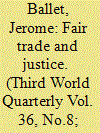

|
|
|
|
|
| Summary/Abstract |
In this article we first point out that the different conceptualisations of Fair Trade, which are sometimes analytically contradictory, actually form a coordinated set. Understanding the Fair Trade project is impossible without taking these interlinked conceptualisations into consideration. Second, this set basically forms a mechanism of structural, institutional and moral reforms that guide actions. In this way Fair Trade sets out to produce less injustice than is usually the case with the structures and institutions that govern conventional trade. Nevertheless, it does not try to define what a just society is or even to perfectly define ‘fair trade’. This implies the adoption of a comparative justice angle. It is precisely by linking comparative individual situations with the structures that produce these situations that relative justice can find its strength and purpose.
|
|
|
|
|
|
|
|
|
|
|
|
|
|
|
|
| 5 |
ID:
140968
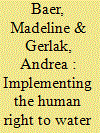

|
|
|
|
|
| Summary/Abstract |
This article explores global and local discourses on how to implement the newly recognised human right to water and sanitation (HRtWS). We analyse the potential limitations of the human rights frame in the context of critiques that human rights are a liberal, Western discourse that does not reflect the lived experiences of non-Western countries. Through two case studies we find that there are two discourses emerging on how to implement the HRtWS. At the global level, as seen in the work of the UN Special Rapporteur on the HRtWS, we find a hegemonic discourse that is state-centric and market-friendly. In Bolivia, a country currently implementing a human rights-based approach to water services, we find a counter-hegemonic discourse on implementation. We argue that the hegemonic discourse is incomplete and does not fully address barriers to fulfilment of the right, such as state corruption and the needs of peri-urban residents.
|
|
|
|
|
|
|
|
|
|
|
|
|
|
|
|
| 6 |
ID:
140969
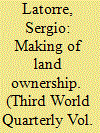

|
|
|
|
|
| Summary/Abstract |
Hernando de Soto’s best-selling book The Mystery of Capital argues that economically disadvantaged countries lack institutional arrangements that can spur economic development and capital growth. This article questions de Soto’s institutional economist account. It draws on a 14-month ethnographic study performed at two rural field sites in Colombia and in the central government office responsible for promoting land programmes designed to improve the living conditions of rural communities. This study, which focuses on the daily practices of public officials and rural campesinos, suggests the importance of the title document, and in particular the public deed, for land ownership. It describes the process by which landownership is created by the issuance of the land title document and highlights some important elements and untended consequences that are often neglected in this process of making land a legal and economic asset.
|
|
|
|
|
|
|
|
|
|
|
|
|
|
|
|
| 7 |
ID:
140966
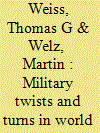

|
|
|
|
|
| Summary/Abstract |
Russia’s challenge to the post-cold war order, and the rise of Islamic State have resulted in a call for increased military spending among NATO members. Despite the increased demand for UN peace operations, any expansion is unlikely to benefit the world organisation. Instead we see an increasing reliance upon regional organisations like the African Union, European Union and NATO, in particular, for robust peace operations. An analysis of Western states (France, Germany and the USA) suggests that future investments in weaponry, technology and staff will primarily benefit NATO and the EU, but not the United Nations.
|
|
|
|
|
|
|
|
|
|
|
|
|
|
|
|
| 8 |
ID:
140963
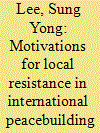

|
|
|
|
|
| Summary/Abstract |
This article discusses the complex motivations underlying local resistance to externally led post-war peacebuilding programmes. In examining the land distribution process in post-war Cambodia it proposes a five-part typology of motivations for the resistance that frequently appears in the context of international post-conflict peacebuilding processes. The article also argues that a single campaign of resistance is likely to involve multiple actors with multiple motivations.
|
|
|
|
|
|
|
|
|
|
|
|
|
|
|
|
| 9 |
ID:
140967
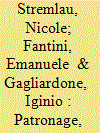

|
|
|
|
|
| Summary/Abstract |
The role of media in promoting political accountability and citizen participation is a central issue in governance debates. Drawing on research into the interactions between radio station owners, journalists, audiences and public authorities during Somali radio call-in programmes we argue that these programmes do not simply offer a new platform for citizens to challenge those who are governing but that they are also spaces where existing power structures reproduce themselves in new forms. We identify the ways the programmes are structured and the different motivations the audience has for participation. Three types of programmes are identified and their relationships with patronage, politics, and performance are examined. Rather than focusing on normative assumptions about the media as a tool of accountability, the article emphasises the importance of understanding radio programmes in their social and political environment, including the overlapping relationships between on-air and off-air networks.
|
|
|
|
|
|
|
|
|
|
|
|
|
|
|
|
| 10 |
ID:
140971
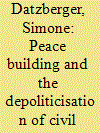

|
|
|
|
|
| Summary/Abstract |
Over the past two decades there has been a rapid increase in funds for local civil society actors in fragile states. Current peace-building and development efforts strive for the recreation of a vibrant, active and ‘liberal’ civil society. In the case of Sierra Leone, paradoxically, this growing support has not strengthened civil society actors based on that liberal idea(l). Instead of experiencing enhanced proactive participation stemming from the civil sphere, Sierra Leone’s civil society appears to be largely depoliticised. Drawing on empirical data gathered over the past four years, this article offers three interrelated causal explanations of why this phenomenon occurred during the country’s peace-building phase from 2002 to 2013. First, Sierra Leone’s civil society landscape has become instrumentalised to serve a broader liberal peace-building and development agenda in several ways. Second, Western idea(l)s of participatory approaches and democracy are repeatedly challenged by the legacies of colonial rule and socially entrenched forms of neo-patrimonialism. Third, abject poverty and the lack of education affect activism and agency from below.
|
|
|
|
|
|
|
|
|
|
|
|
|
|
|
|
| 11 |
ID:
140970
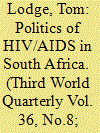

|
|
|
|
|
| Summary/Abstract |
A decade ago it seemed likely that African governments would be destabilised by the impact of the HIV/AIDS epidemic. This article tests some of the presumptions in such forecasting with an examination of the South African case. It begins with an assessment of the effects on the public health system of the South African government’s efforts to cope with the illness. Efforts to implement universal treatment of people who are HIV-positive appear to have strengthened government, while the costs have been affordable. The efforts have extended the embrace of the public health system and prompted the engagement of civil society in policy formation and implementation. Survey evidence suggests that the government has gained public approval and that its health service delivery has become more socially accountable. Civil protest to engender political reforms in the treatment of AIDS patients has enhanced the role of constitutional checks on executive authority.
|
|
|
|
|
|
|
|
|
|
|
|
|
|
|
|